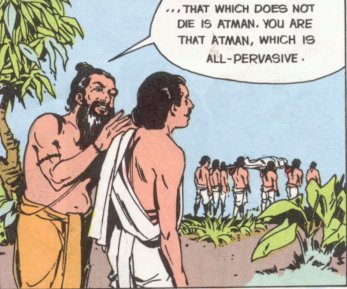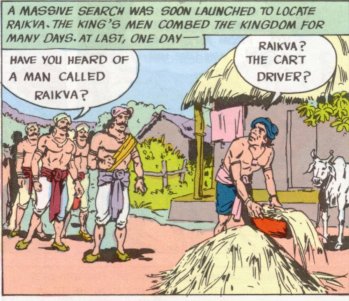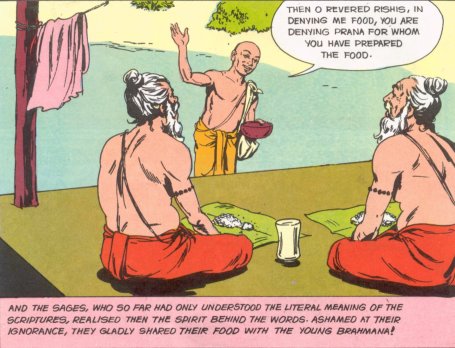

Shvetaketu learns about death (from the Chhandogya Upanishad)
Source: http://www.freeindia.org/ack/Upanishads/upani030.shtml
(downloaded Nov. 1999)
In a story from the Chhandogya Upanishad, Shvetaketu's father answers his questions about death. From the Amar Chitra Katha story "Shvetaketu."
THE ORIGINAL SANSKRIT VERSION:
"Take, for example, son, a man gravely ill. His relatives gather around him and ask: 'Do you recognize me?' 'Do you recognize me?' As long as his voice does not merge into his mind; his mind, into his breath; his breath, into heat; and heat, into the hightest deity, he recognizes them. When, however, his voice merges into his mind; his mind, into his breath; his breath, into heat; and heat, into the highest deity, then he no longer recognizes them.
The finest essence here--that constitutes the self of this whole world; that is the truth; that is the self (atman). And that's how you are, Svetaketu."--Upanisads, trans. Patrick Olivelle (Oxford: Oxford University Press, 1996), pp. 155-156.

The irascible but learned "Raikva the Cartman" (from the Chhandogya Upanishad)
Source: http://www.freeindia.org/ack/Upanishads/upani069.shtml
(downloaded Nov. 1999)
In a story from the Chhandogya Upanishad, a virtuous king seeks out a humble cart-driver famous for knowing Brahman and tries to obtain his wisdom. In the Amar Chitra Katha version, the king first offers much wealth, which is indignantly rebuffed. But his second, much more humble attempt meets with a lecture on humility, and this response: "I bless you, virtuous Janashruti. All the knowledge that is mine shall now be yours."
THE ORIGINAL SANSKRIT VERSION:
In the original text, the king initially goes to Raikva's village and offers him much wealth and six hundred cows in return for instruction. Raikva replies: "Hey, you! Drive them back to your place, Sudra! Keep your goods and your cows!"
The king then makes another try: "Janasruti Pautrayana went back to him once again and said, 'Raikva, here are a thousand cows, a gold necklace, and a carriage drawn by a she-mule, here is [my daughter as] a wife, and here [as an estate] is the village where you live. Sir, please teach me."
This time the response was: "Lifting up her face, Raikva said, 'Hey you! Drive them to my place, Sudra! With just this face you would have swindled me!" And he grudgingly accepted the king as a student.--Upanisads, trans. Patrick Olivelle (Oxford: Oxford University Press, 1996), p. 129.

The young ascetic triumphs over the literalist priests (Chhandogya Upanishad)
Source: http://www.freeindia.org/ack/Upanishads/upani140.shtml
(downloaded Nov. 1999)
A young Brahman ascetic triumphs over some priests who are preparing a ritual sacrifice to Vayu or Prana (the life-breath). This is the concluding panel of the Amar Chitra Katha story "The Bold Beggar." In the Amar Chitra Katha version, the young ascetic asks for food and the priests refuse, since they need it for the ritual. He then wins his case by arguing, "If Prana pervades the universe, it must pervade me too. Who am I but a part of the universe... am I not?" They agree, and realize that they must feed him.
THE ORIGINAL SANSKRIT VERSION:
In the Chhandogya Upanishad text, the young ascetic wins the sacrifice-patron's admiration by terrorizing the priests: he warns them that if they do not properly know the god to whom they are sacrificing, their heads will shatter apart. So the Pratihartr priest asks him who that deity is.
"Food," he replied, "Clearly it is only by partaking of food that all these beings live. This, then, is the deity linked to the Response. If, after I had warned you, you had sung the Response without knowing that deity, your head would have shattered apart."--Upanisads, trans. Patrick Olivelle (Oxford: Oxford University Press, 1996), p. 107.
== Indian Routes index == Indian Routes sitemap == Glossary == FWP's main page ==